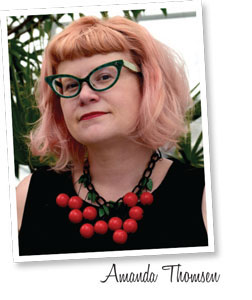6/1/2020
Grief Gardening
Amanda Thomsen

I’m a very private person that plays an extrovert that overshares on paper and social media. In real life, I work strictly on a need-to-know level. If someone asks me how my day is, I’ll smile genuinely and raise my eyebrows in the universally recognized friendly shutdown. A checkout woman at the thrift store once asked me what I was going to do with all the vintage satin hangers I was buying and I famously growled, “I’m going to hang clothes on them.” I don’t go out into this world to make new friends. That’s what Instagram is for.
I believe I’m this way from working in retail for 600 years.
As retail employees, we’re all familiar with customers who overshare. Of course, there are a lot of ways a customer can overshare, but the hardest one for me is the grieving customer, having recently suffered a loss of someone close to them. I’ve heard eulogies—whole life stories and anecdotes—and made wise choices for many bereaved customers, friends and complete strangers for 20 years now, but I’m still not much better at dealing with someone else’s grief. What I can do (I mean the very least I can do) is make informed decisions about plants, talking a dear friend out of purchasing a specific hybrid tea rose to memorialize her sister (it’ll never work and it’ll just be that much sadder when the rose dies, too) and people into the right tree (please, an ornamental pear is not a memorial tree, it’s a nightmare). But I still don’t have the words to comfort the grieving.
I think it’s part of the “bargaining” part in the grief cycle (denial, anger, depression, bargaining and acceptance) to share with the person who rings up your petunias at an outdoor checkout where it’s 101 in the shade. I know I’m not the only one running from grief at all costs, constantly chasing feeling good, running from these awkward interactions and thinking you were completely safe schlepping rose bushes around all day.
Right now, no one is safe; we’re all collectively grieving—not necessarily for someone they’ve lost, but at the same part of the grief cycle, and we’re seeing large segments of society that want to plant a grief garden. Admittedly, gardening is a terrific way to bargain with what’s going on and what lies in our future. I’m just concerned that garden center employees will be asked to serve as therapists now more than ever, on top of everything else we already have loaded on our plates.
How do we empathetically help customers who perhaps overshare or need more than just advice? Is it worth nailing down a protocol for grieving customers? I think it is. How do we not all burn out?
Retail therapy isn’t the same as real therapy—we need to be friendly and welcoming while helping as many customers as possible and getting through our workloads, not heaping more on our mental load. Here are some things I’ve said when caught in the crossfire of an overshare:
• “This is important, of course, but I have a few other customers waiting for my help.”
• “This is what I would plant if I was in your situation.”
• “It’s fun to come and shop here with a friend!”
• “Things are not okay now, but someday, they will be.”
• “Yes, the voices in my head totally agree with you.”
That last one was just for laughs, I swear. Our jobs are already mental and physically exhausting—once we heap out customers’ emotions on top, we’re asking for industry-wide burn out. We got in this for the sweet discounts on plants and the mental load wasn’t part of the bargain. GP
Amanda Thomsen is a funky, punky garden writer and author. Her blog is planted at KissMyAster.com and you can follow her on Facebook, Twitter AND Instagram @KissMyAster.